I’m not exactly an obsessive South Park fan. But I have long admired the ability of creators Trey Parker and Matt Stone to blend smart satire and stupid humor, and to build and maintain control of an outlet that has both longevity (the show has been running nearly two decades) and flexibility (episodes are created within a week’s time, allowing them to respond to current events and cultural climate). Most of my friends respect the Peabody, Emmy, Tony, and Grammy award-winning Parker and Stone but don’t regularly watch South Park, either because its relentless irreverence and vulgarity is not their cup of tea or because the show has seemed to stale a little in recent years. It’s been a little bit of both for me. But in its 19th season, which began in September and concluded last week, some things have changed—in the small, fictional mountain town of South Park, in the show’s technique and structure, and in the America that it’s reflecting.
(NOTE: I should give fair warning that the following contains spoilers, though I have purposefully left some details and many of the season’s plot points out of this.)
2015 has been a beast. Like many, I’ve struggled even to accept this year’s “feed” of outlandishly trivial and seriously horrific developments, much less to begin to reconcile them. This fall, it really seems as if Parker and Stone rose to a call of duty as satirists, not simply to take advantage of the easily parodied characters and events of these absurd times, but to construct a mirror by suddenly unleashing upon their little microcosm of white America a perfect storm of relevant constructs, contradictions, and fears. Rather than single-episode stories, this year’s season of South Park unfolds via an ambitious serial story arc that involves the entire town in a number of interwoven subplots and one bigger mystery. There are, of course, pop culture references and brilliantly funny little situations, jokes, and images throughout. But I was most struck by this season’s larger, complex metaphorical constructions. It’s in these conceptual intersections—especially in the connections drawn between political correctness, gentrification, and manipulative online culture—that we see some of Parker and Stone’s most relevant, biting, and cleverly crafted critiques of American hypocrisy.
“Woo woo woo! That’s the sound of 2015 pulling you over! Suck it!”
Immediately into the first episode, we see a sudden leadership change from out of leftist field. The p.c. principle is introduced via P.C. Principal, an aggressive dude who’s been brought in to make South Park Elementary a more progressive place. He and a group of likeminded p.c.-bros soon form their own frat house and explain to new pledges that being p.c. “means you love nothing more than beer, workin’ out, and that feeling you get when you rhetorically defend a marginalized community from systems of oppression.” Framing political correctness by this band of privileged white male bullies forcefully correcting people’s “microagressions” is hysterical. There’s no more blatant irony than a brutal intolerance of intolerance, and no clearer evidence of privileged ignorance than smugly oversimplifying complex issues. As the series goes on, questions arise about the motivations of p.c., and even about its possible unwitting role as pawn in a larger, evil plot.
“What this town needs is a Whole Foods. It would instantly validate us as a town that cares about stuff.”
In order to convince Whole Foods that the town is worthy of a store, they plan the development of a fancy new arts and food district SoDoSoPa (South of Downtown South Park), built around and literally on the house of the town’s poorest family (Kenny’s). A rival “historic district” simply re-brands a row of existing dives as a hip new area. Episode 3 is full of hilarious recurring commercials for the new urban developments and loft residences—complete with cheesy narration, slick photography, and graphics. These culminate in what is essentially an ad for a new, utopian South Park: a sunlit montage of people at the newly opened Whole Foods, accompanied by a gentle narration announcing the momentous leap of cultural progress for the town. South Park has quickly been “updated”—transformed into an all-too-familiar environment of poorly faked sophistication. Conveying these new developments through the language of commercial branding plays nicely into later themes of advertising and perceived progress.
#ShamelessAmerica
As new restaurants have popped up in the town’s revitalized areas, everyone has immediately become a self-important, power-hungry food critic. Using Yelp as a badge and a low rating as a gun, a war between restaurant owners and online critics escalates. It’s a great take on the subject, especially viewed as not simply about Yelpers but about a broader culture of using online comments as weapons in a new power structure of snark. But my favorite tackling of online culture is the episode “Safe Space,” which explores the flipside of critical comments. In an effort to combat “shaming,” the show’s sweetest child (Butters) is forced to sift through people’s social media accounts and edit out any and all negative comments. The episode’s musical number is a fantastic celebration of self-imprisonment in a solely congratulatory world. But the task of editing all of the terrible comments on the internet (can you imagine a worse hell?) drives Butters insane and brings about the appearance of personified “Reality” as a pesky man with a mustache and top hat. Meanwhile, Randy Marsh heads an anti-shaming campaign, whose ads promise “We won’t rest until America is completely shameless.” For me, the real turning point in the season, and perhaps the best single-image metaphorical representation of America today, is this episode’s dark and profound final moment.
“Ads have become smarter than us, and now they’re manipulating everything we do.”
The season ultimately connects all of its sea of simultaneous issues to the warped media mirrors through which we experience our cultural landscape—a world in which reality and advertising have become indistinguishable. The final episodes skewer the distracting and manipulative nature of ads and sponsored content on the internet, and finally unveil a deep conspiracy of ads becoming sentient, taking human form, and seeking our annihilation. As they’ve become smarter at triggering our fears and fantasies and more sneakily integrated into our news and social networks, we can no longer tell the difference between ads, the news, and ourselves. “Make no mistake. All ads lie. And all ads deceive,” explains a former newsman who now leads an underground resistance. “Ads are among us. They could be your friend, your gardener. The ads are trying to wipe us out.”
One character reveals interesting connections: “What is p.c. but a verbal form of gentrification? Spruce everything up. Get rid of all the ugliness in order to create a false sense of paradise. Only one thing can live in that kind of world… Ads.” Randy Marsh puts the pieces together in this way: “If something not human is gentrifying the world, then soon no human will be able to afford it. They’re trying to price our species out of existence!” “Ads” is an intriguingly complex metaphor here that has been ingeniously sculpted over ten episodes into a single, separate entity. Of course, advertising is not simply the root of all our problems. But, taken to represent a rabid cultural virus that lures us further into an epidemic of shallow self-absorption, distracted ignorance, dishonesty, and extreme reaction, “ads” have indeed become our most urgent foe, preventing us from any kind of nuanced understanding. Of course we’ve created this oppressive force of interruption, obstruction, and deception ourselves. But now that it’s completely out of hand we must view it as an alien invasion in order to unite against it.
While the season began with lampooning political correctness, it ends with P.C. Principal giving a serious address to unite the town against this new, invisible enemy. “A lot of changes will happen in the coming months,” he says, as a cut-in shot references the presidential election and “America The Beautiful” plays. He insists that defeating this enemy requires us being as understanding and non-biased as possible. This creates a really clever bookend for the season, and gives a nudge for us viewers to reconsider some things as we go into a new year.


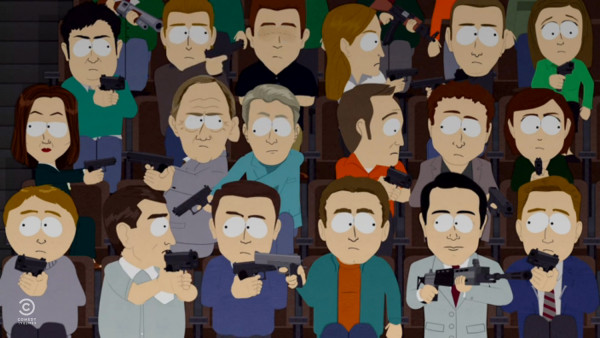
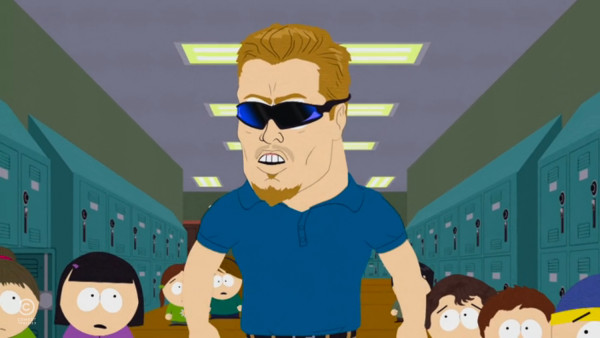
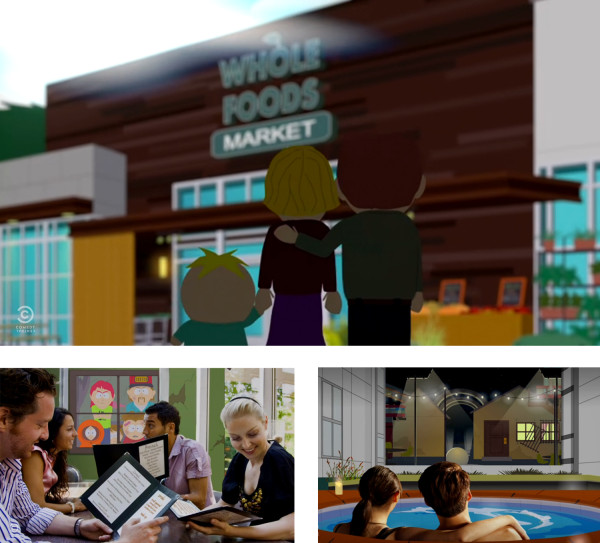
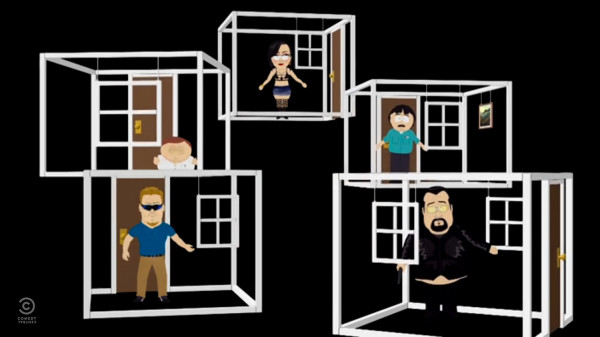
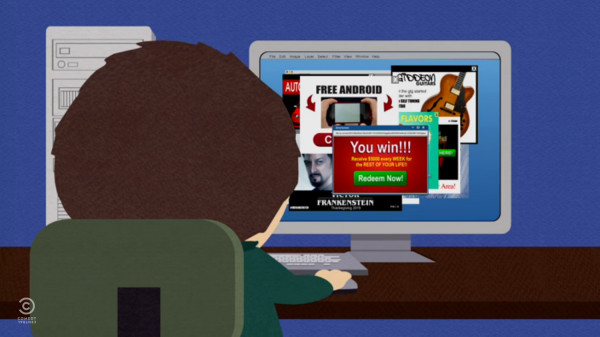
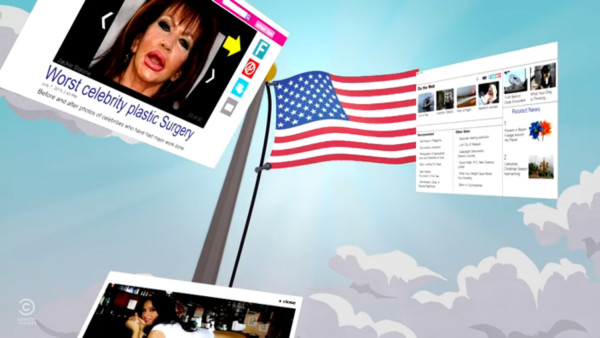

4 comments
Great article/summary of this (hilariously spot-on) season of South Park! One tiny quibble though: the article attributes two quotes to Stan Marsh, when the first (and possibly the second, will have to re-watch the episode) was actually said by Randy Marsh, Stan’s father.
Ah! Yes, Andrea you are absolutely correct. We’ll have to change that.
<3!
Amen-uh!